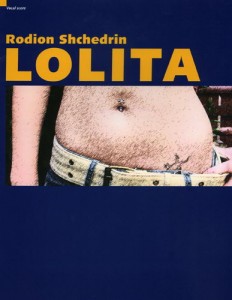Archive for the ‘Lolita’ Category
barbara bloom
Sunday, September 13th, 2009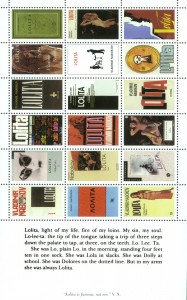 Continuing our Lolita book cover theme I am grateful to Barbara Bloom for providing this image of her 1998 work Lolita Stamps (you can find her design among them) as well as this quote by Susan Tallman from the retrospective catalogue The Collections of Barbara Bloom:
Continuing our Lolita book cover theme I am grateful to Barbara Bloom for providing this image of her 1998 work Lolita Stamps (you can find her design among them) as well as this quote by Susan Tallman from the retrospective catalogue The Collections of Barbara Bloom:
“BB was drawn to the relentless precision of Nabokov’s prose, and also to the manner in which that relentlessness resulted, not in difficult avant-gardism, but in flat out beauty. (The terrifying thing about Lolita is that it is simultaneously so repugnant and so beautiful.) Like the obsessive lover who seeks to re-dress the object of his desire in the clothes he wants to see her in, BB set about designing her own covers for most (not all) of Nabokov’s novels, quite often by gracing them with prior work of her own: Glory (1932) bears the image of BB’s Pride on its cover, and a chain of Nabokov’s beloved butterfly wings from Never Odd or Even: Corner on the back; Invitation to a Beheading (1938) is adorned with two of BB’s museum photographs: the Greek horse head from the British Museum and another of a bit of Classical statuary truncated by the intrusion of a large red hat. The simplest and most straightforward is Despair, with its black-and-white documentation of BB’s broken porcelain KPM Arkadia dinner plate. Most remarkable, however, is the absurdly apropos silhouette BB found for the cover of Lolita: the pompous (and paunchy) Nabokovean male at the lectern, the saucy stance of the little girl (the word minx seems almost unavoidable) who thrusts her hip at his tendentious fingers. One does wonder what other purpose the image could ever have served.”
I am hopeful that in the not too distant future I will be able to ask her a few questions about her art, her interest in Nabokov, her collection of books from his personal library and, of course, what Humbert is doing with those scissors!
don’t try this at home or paging dr. bowldler…
Sunday, September 13th, 2009For those for whom the subject matter of Lolita is just too unsettling, look no further than Lolita, Scrubbed by Gerard Kibbey. In the scrubber’s own words:
“Welcome. Perhaps you’re here because you and I share a love for the wit and poetry found in Nabokov’s classic, Lolita. For a book fan, Lolita is a trove of voice, alliteration, character, plot, assonance, and mood. It’s chock-full of references and culture. But—and for the morally discriminating reader, there’s always that but—it’s the account of a child rapist, told with fluctuating, insufficient remorse. The narrator’s moral depravity left this reader unsatisfied and I doubt I am alone.
My solution: put on my editor hat go to work, creating an alternate edition of Nabokov’s masterwork, Lolita, Scrubbed. In this new (and I hope, improved) version, I seek to retain the lovable poetry of the book’s original text while excising the book’s amoral core. And while I make no claims to be a writer of Nabokov’s caliber, I plan to “re-see” troubling scenes as the author would, were he convinced of the novel’s problematic nature. I also plan, in an effort to make the book more “of our times,” to apply light cuts here and there in areas where I feel the language goes a little overboard.”
I think it’s quite clear that Kibbey’s misguided effort belies a laughably profound misunderstanding of the novel, but I won’t get into that just yet. For now, I leave this for your amusement:
lo-lee-ta: franz koglmann
Wednesday, September 9th, 2009 After stage and screen adaptations, how about a musical interpretation of the novel and its novelist? Viennese composer and trumpeter Franz Koglmann has a new recording, inspired in large part by just that. Using a motif from composer Bob Harris’ “Love Theme” taken from the score of Kubrick’s 1962 film Koglmann’s “dynamically detached chamber jazz” creates a sonic tribute not only to Lolita, but also to other Nabokov works, with titles such as Ada and Van, Vadim Vadimowitsch N., Laura, Just Half a Shade and Martha Dreyer. Past albums by Koglmann include similar treatments of T.S. Eliot, Ezra Pound:
After stage and screen adaptations, how about a musical interpretation of the novel and its novelist? Viennese composer and trumpeter Franz Koglmann has a new recording, inspired in large part by just that. Using a motif from composer Bob Harris’ “Love Theme” taken from the score of Kubrick’s 1962 film Koglmann’s “dynamically detached chamber jazz” creates a sonic tribute not only to Lolita, but also to other Nabokov works, with titles such as Ada and Van, Vadim Vadimowitsch N., Laura, Just Half a Shade and Martha Dreyer. Past albums by Koglmann include similar treatments of T.S. Eliot, Ezra Pound:
“Through intimate musical articulation—orchestrating images and clever intellectual references into playful and provocative word sonatas—it was inevitable that Koglmann would choose to decipher the challenging linguistic maneuvers of world-famous writer Vladimir Nobokov, known as the master of “chamber music in prose,” into a set of musical images.”
http://www.allaboutjazz.com/php/article.php?id=34071
Listen to clips from the album on the col legno website:
lolita my love
Saturday, August 29th, 2009“It was perfectly all right for me to imagine a twelve-year-old Lolita. She only existed in my head. But to make a real twelve-year-old girl play such a part would be sinful and immoral, and I will never consent to it.”
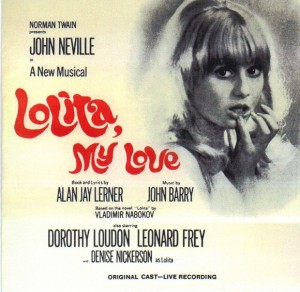 Well, of course Nabokov did consent to it, once for $150,000 and 15% of the producer’s profits for the movie rights (not to mention his fee for the screenplay) and then again for the musical, for which he waived script approval (and probably any serious interest in the project as well).
Well, of course Nabokov did consent to it, once for $150,000 and 15% of the producer’s profits for the movie rights (not to mention his fee for the screenplay) and then again for the musical, for which he waived script approval (and probably any serious interest in the project as well).
It’s still startling to me that in 1971 John Barry and Alan Jay Lerner contributed words and music to a musical of Lolita, called Lolita My Love. Not surprisingly, it was savaged by the critics and closed before its scheduled Broadway opening after only nine performances in Philadelphia and Boston. In 1981 Edward Albee took his chances with a non-musical stage adaptation that was even more disastrously received. It’s not hard to wonder why.
In 2007 a funny letter appeared in the New York Times in response to an article on novels being made into musicals:
To the Editor:
I am sorry that Henry Alford (”Books on Broadway,” Jan. 14), was not able to see ”Lolita, My Love” when it opened in Philadelphia in 1971 (or when it closed in Boston shortly thereafter). The sight and sound of the incomparable Dorothy Loudon belting out ”Sur les Quais de Ramsdale, Vermont” made an unforgettable memory for me. Curiously, audiences had pretty much the reaction that Max Bialystock hoped for with ”Springtime for Hitler.”
Carol Clapp
West Hartford, Conn.
Carol Clapp! That song is at the bottom of this post. Judge for yourself:
But even more obscure is the 1994 world premiere in Stockholm of Rodion Shchedrin’s three-hour opera of Lolita (in Swedish) conducted by none other than the great Mstislav Rostropovich and attended by Nabokov’s son and translator Dmitri. Incidentally Shchedrin was married to prima ballerina assoluta Maya Plisetskaya for whom he created several ballets, including Anna Karenina and The Little Humpbacked Horse. The opera was well received, and Act II is still occasionally performed. The image below is like no opera I’ve ever seen!
hebrew translation of lolita
Friday, August 28th, 2009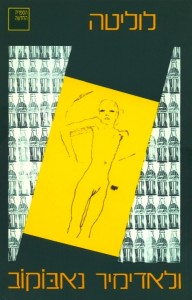 Perusing this publisher’s website, it’s apparent that book cover design is not their strong suit. That being said, I am fascinated by this cover of the Hebrew translation of Lolita. The skeletal image of Lolita looks like it was hijacked from an Egon Schiele drawing or worse. Is this Lolita as anorexia sufferer or concentration camp prisoner? It’s a haunting image to be sure and, given what the poor girl was subjected to, perhaps entirely appropriate. Many covers choose to concentrate on Lolita’s innocence and even physical attractiveness, but this is the embodiment of her torment, a naked, skin and bone, practically bald Lolita, with unseeing eyes like a mask from a Greek tragedy, stripped bare in every way. That would have been enough. The Andy Warhol Coke bottles, now that’s just ridiculous.
Perusing this publisher’s website, it’s apparent that book cover design is not their strong suit. That being said, I am fascinated by this cover of the Hebrew translation of Lolita. The skeletal image of Lolita looks like it was hijacked from an Egon Schiele drawing or worse. Is this Lolita as anorexia sufferer or concentration camp prisoner? It’s a haunting image to be sure and, given what the poor girl was subjected to, perhaps entirely appropriate. Many covers choose to concentrate on Lolita’s innocence and even physical attractiveness, but this is the embodiment of her torment, a naked, skin and bone, practically bald Lolita, with unseeing eyes like a mask from a Greek tragedy, stripped bare in every way. That would have been enough. The Andy Warhol Coke bottles, now that’s just ridiculous.
http://www.newlibrary.co.il/Htmls/product.aspx?c0=13151&bsp=12839
brian cox plays humbert humbert on stage
Friday, August 28th, 2009 “To play Humbert Humbert, the narcissistic self-styled “nympholept”, demands a brooding presence and a rich distinctive voice, and it is brooding, dark-voiced Brian Cox who will sit alone in Humbert’s prison cell on the Lyttelton stage, in Richard Nelson’s adaptation of Lolita.”
“To play Humbert Humbert, the narcissistic self-styled “nympholept”, demands a brooding presence and a rich distinctive voice, and it is brooding, dark-voiced Brian Cox who will sit alone in Humbert’s prison cell on the Lyttelton stage, in Richard Nelson’s adaptation of Lolita.”
“When Nelson sent his adaptation, Cox hesitated and took advice; then realised that a one-man presentation would be truer to the book, which is essentially an apologia pro vita sua, than the films. “The voice of Humbert is embodied — his head, his mien — telling his story in his prison notebook, when he’s about to have his fatal heart attack.” (As Humbert writes: “My gloomy good looks should be kept in the mind’s eye if my story is to be properly understood.”) “It’s not about Lolita as a flesh and blood entity. It’s Lolita as a memory, and a cathartic experience because it’s a tragedy.””
http://entertainment.timesonline.co.uk/tol/arts_and_entertainment/stage/theatre/article6813294.ece
lolita title sequence
Thursday, August 27th, 2009greater than equal to
Wednesday, August 26th, 2009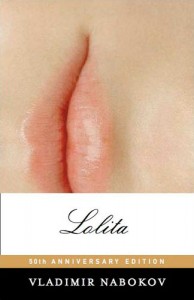 In addition to mentioning our competition, the blog Greater Than Equal To came up with a series of compelling links relating to Lolita covers. Check it out below to see a clip of Nabokov himself commenting on several of them, as well as a link to an interview with Vintage Books art director and cover designer John Gall in which he discusses his clever and controversial Lolita cover that never made it into print, at least not with its controversy intact.
In addition to mentioning our competition, the blog Greater Than Equal To came up with a series of compelling links relating to Lolita covers. Check it out below to see a clip of Nabokov himself commenting on several of them, as well as a link to an interview with Vintage Books art director and cover designer John Gall in which he discusses his clever and controversial Lolita cover that never made it into print, at least not with its controversy intact.
“After retrenching I came up with one of my favorite covers of all time. A very simple variation on a standard Lolita theme yet with a very subversive twist. I was surprised how well it went over, but after a day or so everyone started to get a little queasy looking at it (myself included). So the twist was taken out and we have what the New York Post said was the “raciest cover yet” for Lolita. If they only knew.”
